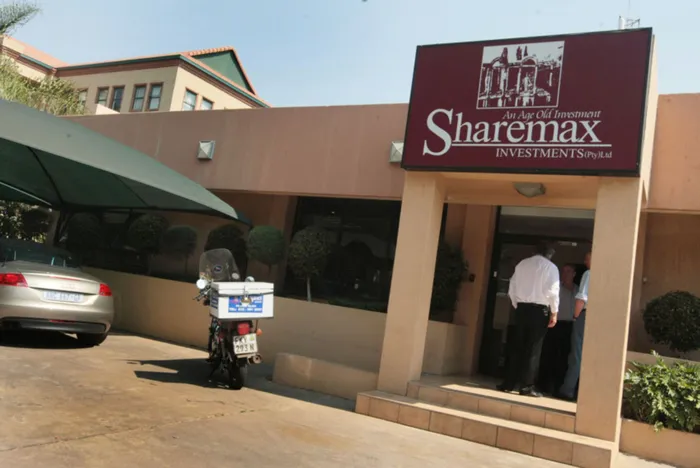FAIS Ombud still dealing with Sharemax and related tragedies

A file photo of Sharemax’s head office. By Simphiwe Mbokazi
WORDS ON WEALTH
By Martin Hesse
Last week the office of the Ombud for Financial Services Providers, more widely known as the FAIS Ombud, produced its annual report for 2020/21, which you can access here.
It was interesting to see that four determinations detailed in the report involved property syndications that went belly up at least a decade ago.
Investors lost billions in these syndications, the most notorious of which was Sharemax. Others included Realcor and BlueZone.
Property syndications flourished in the years leading up to the global financial crisis of 2008. The property market was booming and many investors were persuaded to invest in these complex, murky structures, containing companies within companies. The investment brochures were colourful, glossy and persuasive, describing in glowing terms the various developments the syndications were investing in. The advisers who peddled the investments enjoyed handsome commissions. They didn't care to whom they sold, nor did they pay any attention to the risks involved.
The Financial Advisory and Intermediary Services (FAIS) Act, which regulates financial advice – requiring, among other things, that an adviser thoroughly assesses your needs and circumstances before recommending a particular product – had come into play in 2004, but it seems many advisers weren't paying much attention to it at the time. After all, the markets were booming and everyone was making money.
Then came the crisis and the property market took a dive, and suddenly these schemes were in trouble and couldn't afford to carry on paying the high returns that investors had been assured were rock solid.
Some syndications limped on and, unbelievably, continued persuading people to invest, at which point they became little more than Ponzi schemes, with new investor money coming in used to pay existing investors.
When around 2010 the regulators woke up to the syndications' machinations, they clamped down, at which point the syndications folded like cardboard cut-outs in a strong breeze.
The thousands of investors, many of whom were pensioners who had committed large portions of their retirement capital, were suddenly faced with penury. Some committed suicide. One man shot himself through the heart in front of Sharemax’s head office.
What happened at Sharemax was heartbreaking (and iniquitous).
Instead of going into liquidation, whereby investors would have received the proceeds from a sell-off of assets, a “rescue plan” was devised in 2012 in which a new company, Nova Property Group, was born. Most investors opted to trade in their Sharemax investments for debentures in a Nova subsidiary, with the expectation they would be recompensed over time. That has not happened – Nova has slowly been selling off the Sharemax assets, but the investors have received only about R176 million out of the R4.6 billion they invested, according to Moneyweb. Meanwhile the directors of Nova, two of whom were also directors of Sharemax (Connie Myburgh and Dominique Haese), have been living the good life on the exorbitant multi-million-rand salaries they have awarded themselves. In the nine years to February this year, according to Moneyweb, Myburgh and Haese have earned about R35 million each in salaries and bonuses.
In a recent blow to the investors, Nova said it would not repay investors within the 10-year period envisaged in the original rescue plan, according to Moneyweb. The period expires on January 20, 2022.
One way open to investors to claim some sort of compensation was from the financial advisers (if you can refer to them as such) who had “advised” them to invest their hard-earned and diligently-saved money. They could do this through a private attorney or, as some have, or at no cost, through the FAIS Ombud (which is limited to R800 000 in compensation per case).
The claims at the FAIS Ombud’s office quickly piled up, especially during a few years when, through a court judgment, the ombud was prevented on ruling on these property-syndication-related cases.
This explains why, a decade later, the ombud is still dealing with the backlog, and the determinations continue to reflect this.
STATISTICS
During the 2020/2021 financial year, the FAIS Ombud (the acting ombud is Adv Nonku Tshombe) received 10 552 new complaints. This represents a 19.43% increase over the 8 835 complaints received over the preceding financial year. A significant 66% of all complaints received during the year were within the mandate of the office, resulting in 6 975 complaints being referred to the Case Management Department for investigation, the most ever since the inception of the ombud’s office and a significant increase over the 5 750 complaints referred during the 2019/2020 financial year.
Of the 9 755 complaints resolved during the year (including cases carried over from the previous reporting period), 5 079 were dismissed, 2 947 were referred to other fora, 1 710 were settled in favour of the complainant and 19 determinations were made.
The overall settlement value for the 2020/2021 financial year was R49 773 803.
The office says the dismissal of complaints is only considered after significant due diligence has been undertaken during the investigation, and the office is required by law to provide detailed reasons for any decision made inclusive of complaints dismissed.
The report notes that the figures above do not include complaints that the office still deals with in respect of investments made into property syndication schemes. These complaints are maintained separately, and during the 2019/2020 financial year, the ombud committed to reduce the original number of 1 300 active property syndication complaints by a minimum of 20%. As at March 31, 2021, it was able to reduce this number to 1 036, a reduction of 20.31%. The ombud’s office says it continues to set annual targets for the reduction of these complaints and it is expected that a total clean-up will soon be announced.
PERSONAL FINANCE
Related Topics: